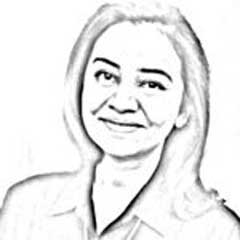While repeatedly failing in my attempts to tell an untold tale and finish a book that I have always wanted to write and make public, for the past many years, I have finally decided to document those stories that can be shared without adding more sadness and problems to my life. These repeated humiliations in life, caused by gaslighting, betrayals, and being discredited in personal and professional spheres, have led me to this point. My sentiments can only be understood by those who are permanently honest, naïve, and struggling individuals living by choice in Pakistan. One of my coping mechanisms, to distract myself from personal pains, has been to examine the lives of those remarkable individuals who have done significant quality work but were never fairly recognized. While recognition and fairness can be subjective, I will use popularity, mainstreaming, limelight, fame, and fortune as substitutes when comparing them to their contemporaries.
I have showcased various personalities in different areas of my work. In my book titled “Successful Social Entrepreneur: Heart and Head Together,” I wrote about icons in social entrepreneurship, where feminism serves as the common denominator. If you do not identify as a feminist, then who are you? While understanding the risks and discomfort associated with the mere word “feminist,” I still wonder who would want to be quoted as an anti-equalist and egalitarianist? During the existence of one of my innovative social entrepreneurial initiatives, Kafe Kaam (Joy of Work), when it was alive in physical space, I used to organize Tributism and Celebritism series. This experience made me realize that in this era of information technology and readily available information through web surfing, the general knowledge of our young people in different industries is quite disappointing. Most of them have acquired knowledge on subjects such as arts, literature, and music through Facebook and Google searches. This is not surprising, considering the ways of the present-day world in general and the situation in Pakistan in particular, where even the fortunate few who attend universities, including expensive ones, do not bother to buy textbooks. As an occasional university teacher, I have had to swallow this bitter pill many times.
In this era of information technology, the general knowledge of our young people is quite disappointing.
In bits and pieces, I still attempt to record homages to magnificent Pakistani feminists who dominate a niche clientele but are generally marginalized in memories and mentions. I consider myself immensely fortunate to have met most of them at different stages of my life. Some of them are precious parts of my childhood memories. One of these gems is Sara Shagufta, a powerful poet of Punjabi and Urdu. I have yet to see a woman as unique as her. I used her poetry as my humble tribute in my pioneering TV award-winning series, Gender Watch, in 1999. Sara completed her life on this earth at the age of 29. Personally, all suicides are murders because those who develop the strength to die have been compelled to this decision by others. Nevertheless, such beliefs are not legally accurate as judgments in the courts are based on acceptable evidence.
Amrita Pritam has paid a valuable tribute to Sara. Our legend, Parveen Shakir, wrote a free verse poem (“Tomato Ketchup”) that evokes sympathy and curiosity for Sara (perhaps least desired by her, if at all) but does not establish her as a woman with individuality. PTV Karachi once produced a drama series, “Muthi Bhar Asman,” inspired by her life. As far as I can recall, that was a failed attempt. I wonder if Gujranwala, the place of her birth, has honoured her or if the literary and cultural circles in Karachi, where she worked and was mentored by the pioneer of Urdu prose poem (genre) and abstract painter Qamar Jamil, have recognized her. Despite the many donor-driven initiatives and original tweets from our young women deconstructing patriarchy and misogyny, I believe our society, including its intellectuals (pseudo-included), has yet to gather the courage to respect her entirely, destigmatize her, and use her work in mainstream activism and advocacy for women’s and human rights.
I want to mention two more extraordinary feminists here. The late Najma Sadeque, a Bengali, who chose Pakistan after 1971, is one of them. If anyone wants to understand how poverty arises, the concept of the green economy, who truly governs the world, Pakistan’s dynamics, and, above all, the essence of authentic journalism and activism, they should become acquainted with the polymath Najma Sadeque. In 2003, when I conceptualized and organized the first-ever International Youth Conference on human development, Ms Sadeque graciously accepted our invitation to be the keynote speaker. Twenty years ago, I observed that one cannot be considered “eminent” by callous standards unless they are a marketer. Zahida Hena, a prominent Urdu columnist with numerous accolades and awards to her name, is another astounding feminist personality. However, her status as a nonconformist woman and a single divorced mother by choice has yet to be fully understood and appreciated.
If circumstances allow, I hope to continue writing about lesser-known Pakistani feminists who remain unfamiliar to our younger generation in the future. However, for now, I am daring to share my personal and heartfelt opinion.
The writer is a serial social entrepreneur, activist, gender expert and former TV anchor & producer. She tweets @dr_rakhshinda and can be reached at founderkafekaam@gmail.com
